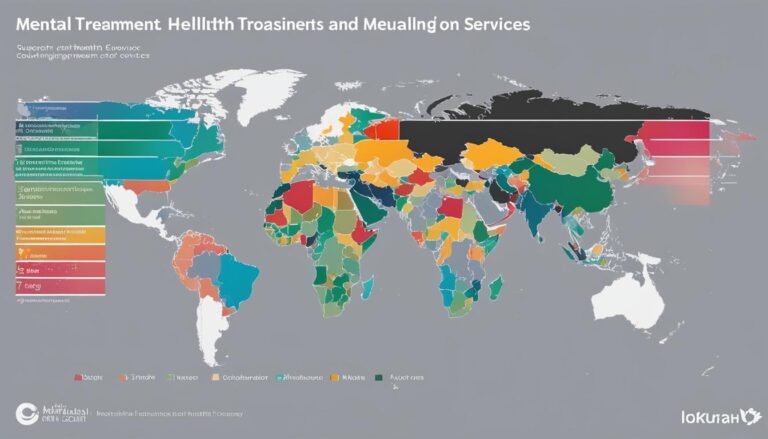Can a person with mental illness be happy?
When we think about happiness, it usually seems like something everyone wants. We often see it as beyond our mental health conditions. But can someone truly be happy with a mental illness? Yes, people can find joy and contentment despite their mental health struggles. They might see happiness in a different light, though.
About 1 in 5 adults in the U.S. deals with mental illness every year1. These are not just numbers. They’re our loved ones facing tough emotions each day. It’s true that around 28% of these people find it hard to be happy in their relationships1. But with the right support and specific help, they can still lead joyful lives. Happiness is more than just a simple feeling; it’s a journey that can include mental health issues2.
In light of the World Health Organization’s view, true well-being is a mix of physical, mental, and social health. The Canary Islands Mental Health Plan and the European Action Plan for Mental Health are working to boost people’s mental well-being. They focus on social support and life quality. These efforts show that even with struggles, happiness is possible and vital for full recovery2.
To understand happiness alongside mental illness, we look at the stories of those who’ve been there. By sharing personal accounts and research, we hope to shed light on finding joy despite mental health challenges.
Key Takeaways
- Living with mental illness does not preclude the possibility of experiencing happiness.
- 1 in 5 adults experience mental illness each year, underscoring the universal relevance of mental health discussions1.
- Severe stress in relationships is a common challenge for those with mental illness, affecting their joy1.
- Support systems and tailored interventions are key to achieving mental health happiness and improving quality of life2.
- Efforts like the Canary Islands Mental Health Plan highlight the importance of social functioning and well-being for individuals with mental health challenges
Understanding Mental Illness
Mental illness is more than just a character flaw. It’s a complex issue tied to genetics, brain chemical balance, and life events. For about 25% of people, mental health conditions like anxiety, depression, or substance misuse can greatly affect their daily life3.
Types of Serious Mental Illnesses (SMI)
Illnesses such as bipolar disorder, major depressive disorder (MDD), and schizophrenia are termed serious mental illnesses (SMI). Those with bipolar disorder often experience significant mood shifts, making day-to-day activities challenging. Schizophrenia, impacting around 1.1% of adults globally, can cause someone to see or believe things that aren’t real4. MDD affects about 16.1 million American adults each year, a big part of the adult population4. Risk can increase for these illnesses due to abuse or neglect during childhood or significant life challenges5.
Impact on Daily Life and Functioning
The impact of mental illness is profound and can disrupt daily living. Close to half of all people will face a mental health disorder in their lifetime, showing how common these issues are5. Anxiety, which affects 40 million American adults yearly, is a significant part of these disorders4. In South Africa, efforts are focused on early and ongoing care. This aims to help people effectively deal with their mental health issues and live productively. Regular, simple self-care activities can significantly improve mental health5.
Here’s a table summarizing key SMIs and their prevalence:
| Type of SMI | Annual Prevalence | Common Symptoms |
|---|---|---|
| Bipolar Disorder | 1% (Est. Global) | Intense mood swings |
| Major Depressive Disorder (MDD) | 6.7% in the U.S4. | Persistent sadness |
| Schizophrenia | 1.1% Globally4 | Hallucinations, Delusions |
| Anxiety Disorders | 18.1% in the U.S4. | Excessive worry, Stress |
Defining Happiness
Happiness is complex, especially in philosophy and psychology. It includes a variety of feelings and states. These go from short bursts of joy to deep, lasting satisfaction.
Dimensions of Happiness
Experts break happiness into three main parts: personal, social, and over time. Personal happiness is about how satisfied you are with life. Interpersonal happiness involves your relationships with others. And temporal happiness covers both short-lived joys and lasting contentment6.
Studies with people aged 20 to 69 support this. They show these dimensions greatly affect how happy someone feels6.
Philosophical and Psychological Perspectives
From Aristotle to today, happiness has intrigued both philosophers and psychologists. Philosophers connect happiness with being virtuous. Psychologists see it as key to mental and emotional health.
A survey in the Netherlands found a link between happiness and mental health. It showed 84.6% of those who were rarely happy had a history of mental illness7. This proves mental health and happiness are closely tied. Both fields are needed to understand it fully.

Happiness in People with SMI
For those with Severe Mental Illness (SMI), being happy can be hard. Things like medications, stigma, and the lasting nature of mental illness can lower happiness. Even so, happiness is still possible. Schizophrenia, for instance, doesn’t stop someone from being happy6.
Efforts in rehabilitation, support, and finding purpose can help. They often lead to levels of happiness similar to those without mental illness6.
Happiness is key to recovering for people with mental health issues. Some suggest we look at happiness as a psychiatric disorder. This is because it has its own set of symptoms and can affect thinking8. Helping people with SMI find happiness offers them a more meaningful life.
Factors Contributing to Happiness
There are many things that make us happy. These include how we are by ourselves, with others, and across time. Each part is important in making us feel good and happy.
Personal Dimension
Our genes decide half of our happiness potential. Our actions and thoughts make up the other 40%. So, this shows how what we do matters a lot for how happy we feel9. Being happy and satisfied with life has many benefits. It can boost our health, creativity, work success, and make us better at facing tough times9.
Overcoming mental health issues is key to being happy. To feel better, you can use gratitude, be mindful, exercise, and get professional help10. These can help a lot with happiness and feeling stable.

Interpersonal-Relational Dimension
Having good relationships with people is very important for our happiness. Positive, close relationships make us happier according to studies11. Feeling free, secure, and loving in our relationships also adds to our happiness and well-being11.
It’s important to have supportive friends and family. This can help with mental health recovery and happiness. Liking yourself and having strong bonds with others can make a big difference in how happy you are11.
Temporal Dimension
Happiness changes over time. It can be short-lived or long-lasting. Doing things like celebrating others’ successes and setting goals can bring lasting happiness9.
Recognizing mental health issues is tough because they’re not always visible. This makes it important to take care of our minds with things like mindfulness and staying active10. These simple habits can keep us happy even when things are hard.
| Dimension | Key Factors | Impact on Happiness |
|---|---|---|
| Personal | Genetics, Emotions, Physical Health | Determines overall capacity for happiness9 |
| Interpersonal-Relational | Close Relationships, Social Support | Strong predictors of mental well-being11 |
| Temporal | Momentary Joy, Enduring Satisfaction | Influences sustained happiness910 |
Challenges to Happiness for Those with Mental Illness
People with mental illness go through many hurdles in their quest for joy. One big issue is the downsides of their medications. These can lead to extra weight, troubles with sex, and other discomforts. These side effects often lower their self-view and create fears, which keeps them from feeling normal or happy. What’s more, emotional pain hurts just like physical pain and is processed in the same brain parts. This shows how serious these issues are12.
Medication Side Effects
For many, medicine is both a help and a problem. It’s crucial for managing symptoms but its cons can really cut into living well. Weight gain and sex problems are usual side effects. They can make someone feel worse about themselves and about life in general13. Also, these cons might push them towards emotional ups and downs as well as addictive habits, which are common in these groups12.
Social Stigma and Isolation
Dealing with the stigma and being isolated is a huge challenge for those with mental health issues. This stigma often makes socializing hard, which then affects their chances at good relationships12. Feeling hopeless can lead to thoughts of suicide, making happiness even harder to reach13. With no social or work life to keep them engaged, loneliness and exclusion set in, creating a tough cycle13.
Impact of Chronicity and Dual Pathologies
The long-term effects of many mental issues and the added challenge of having both mental health problems and addiction make finding joy harder12. Conditions like bipolar disorder or severe depression can really get in the way of living well and being satisfied13. But getting help early and from professionals can improve mental resilience, self-worth, and the overall balance of life14.
FAQ
Can a person with mental illness be happy?
What types of serious mental illnesses (SMI) are there?
How do SMIs impact daily life and functioning?
What are the dimensions of happiness?
What are the philosophical and psychological perspectives on happiness?
How is happiness perceived in people with SMI?
What personal factors contribute to happiness?
What role do interpersonal relationships play in happiness?
How does the temporal dimension influence happiness?
What are the challenges to happiness for those with mental illness?
How do medication side effects affect happiness?
What impact does social stigma and isolation have on individuals with mental illness?
How do chronicity and dual pathologies impact happiness?
Source Links
- Living With Someone With Mental Illness – https://www.verywellmind.com/coping-with-a-mentally-ill-spouse-2302988
- Yes, Mental Illness Can Cause Physical Symptoms — Here’s Why – https://www.healthline.com/health/mental-health/mental-illness-can-cause-physical-symptoms
- PDF – https://www.un.org/en/healthy-workforce/files/Understanding Mental Health.pdf
- Types of Mental Illness – https://www.webmd.com/mental-health/mental-health-types-illness
- Mental illness – https://www.healthdirect.gov.au/mental-illness
- Happiness and Mental Disorders – https://www.ncbi.nlm.nih.gov/pmc/articles/PMC9499168/
- Do They Know How Happy They Are? On the Value of Self-Rated Happiness of People With a Mental Disorder – Journal of Happiness Studies – https://link.springer.com/article/10.1007/s10902-010-9227-5
- A proposal to classify happiness as a psychiatric disorder. – https://www.ncbi.nlm.nih.gov/pmc/articles/PMC1376114/
- Positive Psychology Strategies for Increased Happiness – https://www.unh.edu/pacs/positive-psychology-strategies-increased-happiness
- How Mental Stability Affects Happiness – https://amfmtreatment.com/how-mental-stability-affects-happiness/
- PDF – https://ijip.in/wp-content/uploads/2020/05/B00385V2I32015.pdf
- Ways Mental Stability Can Affect Your Happiness – https://amfmtreatment.com/mental-stability-happiness/
- Hopelessness and life satisfaction in patients with serious mental disorders: A cross-sectional study – https://www.ncbi.nlm.nih.gov/pmc/articles/PMC10170375/
- Living Well with Serious Mental Illness – https://www.samhsa.gov/serious-mental-illness






